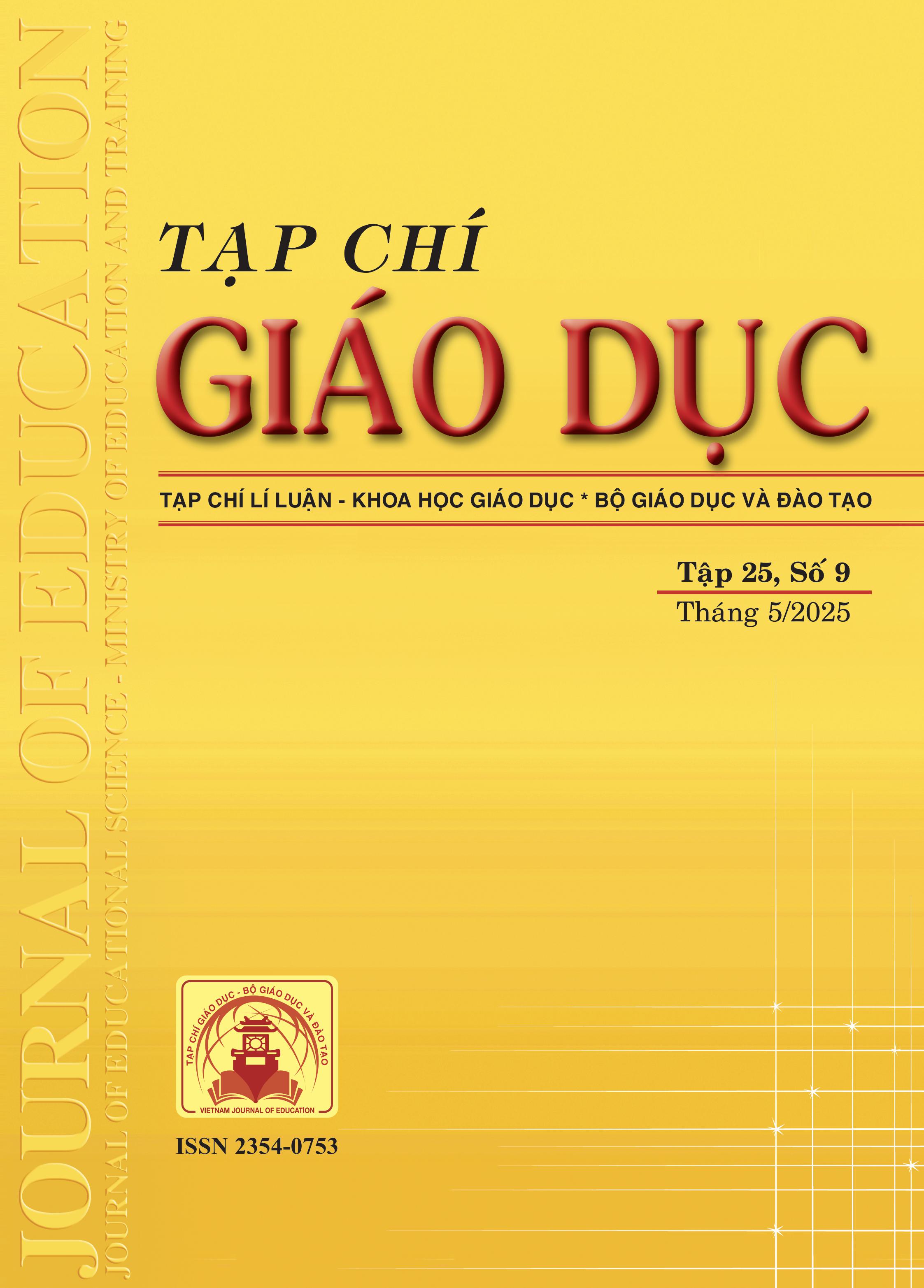Dạy học chủ đề “Làm quen với biến cố ngẫu nhiên” (Toán 7) theo thuyết giáo dục toán học gắn với thực tiễn (RME) cho học sinh
Tóm tắt
Realistic Mathematics Education (RME) is a teaching approach adopted by many countries worldwide to bridge the gap between school mathematics and practical life. This disparity often makes it difficult for students to perceive the significance of learning mathematics, leading to a lack of motivation and engagement. Therefore, creating a practical learning environment combined with appropriate teaching methods has become an essential requirement to help students gain a deeper understanding and effectively apply mathematical knowledge in real life. Based on this foundation, this paper focuses on teaching the topic “Introduction to Random Events”(Math Grade 7) following the RME approach for students to enhance their learning outcomes. The study employs theoretical and practical analysis to propose an instructional framework and appropriate teaching strategies. The research findings serve as a valuable reference for teachers, educational researchers, and middle school administrators, contributing to the formulation of policies aimed at improving mathematics education quality.
Tài liệu tham khảo
Ardiyani, S. M. (2018). Realistic Mathematics Education in Cooperative Learning Viewed from Learning Activity. Journal on Mathematics Education, 9(2), 301-310.
Bộ GD-ĐT (2018). Chương trình giáo dục phổ thông môn Toán (ban hành kèm theo Thông tư số 32/2018/TT- BGDĐT ngày 26/12/2018 của Bộ trưởng Bộ GD-ĐT).
Bray, A., & Tangney, B. (2016). Enhancing student engagement through the affordances of mobile technology: a 21st century learning perspective on Realistic Mathematics Education. Mathematics Education Research Journal, 28, 173-197.
Fauzan, A. (2002). Applying Realistic Mathematics Education (RME) in teaching geometry in Indonesian primary schools.
Freudenthal, H. (1977). Weeding and sowing: Preface to a science of mathematical education. Springer Science & Business Media.
Freudenthal, H. (2005). Revisiting mathematics education: China lectures (Vol. 9). Springer Science & Business Media.
Gravemeijer, K. P. E. (1994). Developing Realistics Mathematics Education. CDB Press, Utrecht.
Kizito, R. N. (2012). Realistic Mathematics Education (RME) as an instruction design perspective for introducing the relationship between the derivative and integral via distance education. Stellenbosch: Stellenbosch University.
Laurens, T., Batlolona, F. A., Batlolona, J. R., & Leasa, M. (2017). How does realistic mathematics education (RME) improve students’ mathematics cognitive achievement? Eurasia Journal of Mathematics, Science and Technology Education, 14(2), 569-578.
Lê Thùy Trang, Phạm Anh Giang, Nguyễn Tiến Trung (2021). Vận dụng lí thuyết giáo dục toán thực (Realistics Mathematics Education) trong dạy học: Một số thách thức, nguyên tắc và khuyến nghị. Tạp chí Giáo dục, 494, 37-43.
Luu Tra My (2024). Applying the Principles of Realistic Mathematics Education (RME) in Teaching Fourth-Grade Mathematics in Vietnam. Journal of Science Educational Science, 9(3),151-161.
Nguyễn Tiến Trung, Phan Thị Tình (2020). Giáo dục toán thực (realistic mathematics education): Một số nghiên cứu lí luận và gợi ý cho việc nghiên cứu phát triển chương trình giáo dục toán học ở Việt Nam. Tạp chí Khoa học, Trường Đại học Sư phạm Hà Nội, 65(4), 130-145.
Peni, N. R. (2019). Development framework of ethnomathematics curriculum through realistic mathematics education approach. IOSR Journal of Research & Method in Education (IOSR-JRME), 9(4), 16-24.
Putri, S. K., & Syahputra, E. (2019). Development of Learning Devices Based on Realistic Mathematics Education to Improve Students’ Spatial Ability and Motivation. International Electronic Journal of Mathematics Education, 14(2), 393-400.
Tong, D. H., Nguyen, T.-T., Uyen, B. P., Ngan, L. K., Khanh, L. T., & Tinh, P. T. (2022). Realistic Mathematics Education’s Effect on Students’ Performance and Attitudes: A Case of Ellipse Topics Learning. European Journal of Educational Research, 11(1), 403-421.
Trần Cường, Nguyễn Thùy Duyên (2018). Tìm hiểu lí thuyết giáo dục toán học gắn với thực tiễn và vận dụng xây dựng bài tập thực tiễn trong dạy học môn Toán. Tạp chí Giáo dục, số đặc biệt kì 2, 165-169.
Trần Nam Dũng, Trần Đức Huyên, Nguyễn Cam, Nguyễn Văn Hiển, Ngô Hoàng Long, Nguyễn Đặng Trí Tín (2024). Toán 7 (sách giáo viên). NXB Giáo dục Việt Nam.
Treffers, A. (2012). Three dimensions: A model of goal and theory description in mathematics instruction-The Wiskobas Project (Vol. 3). Springer Science & Business Media.
Vos, P. (2018). “How real people really need mathematics in the real world” - Authenticity in mathematics education. Education Sciences, 8(4), 195.
Wahyudi, M., Joharman, M., & Ngatman, M. (2017). The Development of Realistic Mathematics Education (RME) for Primary Schools’ Prospective Teachers. International Conference on Teacher Training and Education 2017 (ICTTE 2017), 730-742.
Yilmaz, R. (2020). Prospective Mathematics Teachers’ Cognitive Competencies on Realistic Mathematics Education. Journal on Mathematics Education, 11(1), 17-44.
Zulfah, E., Fauzan, A., & Arnawa, I. M. (2024). Development of Local Instructional Theory on Parallelogram Topics Based on RME to Improve Mathematical Problem-Solving Skills. Journal of World Science, 3(3), 391-397.
Tải xuống
Đã Xuất bản
Cách trích dẫn
Số
Chuyên mục
Giấy phép

Tác phẩm này được cấp phép theo Ghi nhận tác giả của Creative Commons Giấy phép quốc tế 4.0 .












